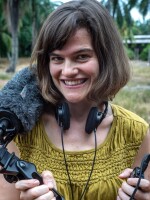
Michaeleen Doucleff
Michaeleen Doucleff, PhD, is a correspondent for NPR's Science Desk. For nearly a decade, she has been reporting for the radio and the web for NPR's global health outlet, Goats and Soda. Doucleff focuses on disease outbreaks, cross-cultural parenting, and women and children's health.
In 2014, Doucleff was part of the team that earned a George Foster Peabody award for its coverage of the Ebola outbreak in West Africa. For the series, Doucleff reported on how the epidemic ravaged maternal health and how the virus spreads through the air. In 2019, Doucleff and Senior Producer Jane Greenhalgh produced a story about how Inuit parents teach children to control their anger. That story was the most popular one on NPR.org for the year; altogether readers have spent more than 16 years worth of time reading it.
In 2021, Doucleff published a book, called Hunt, Gather, Parent, stemming from her reporting at NPR. That book became a New York Times bestseller.
Before coming to NPR in 2012, Doucleff was an editor at the journal Cell, where she wrote about the science behind pop culture. Doucleff has a bachelor degree in biology from Caltech, a doctorate in physical chemistry from the University of Berkeley, California, and a master's degree in viticulture and enology from the University of California, Davis.
-
One day you're worrying about the regular old coronavirus. Then — seemingly out of the blue — there are variants. Worrisome variants! How did they come to be? And why are they likely more contagious?
-
It appears to be 50% more infectious, and researchers predict the new coronavirus variant could start to dominate in the U.S. by March. The time to prepare is now, they say.
-
Wealthy countries have a strategy to secure doses of any forthcoming vaccines. And that's creating a problem for lower-income nations.
-
On an eight-hour Emirates flight, with mask-wearing enforced, a whopping 27 coronavirus-positive people boarded the plane in Dubai. Guess how many passengers got infected?
-
There's evidence that certain vaccines boost the body's defense against many kinds of illness. Scientists are investigating whether this benefit extends to protection from COVID-19.
-
As if the pandemic weren't enough, people are wondering whether climate change will cause pathogens buried in frozen ground to come back to life as the Arctic warms. How worried should we be?


